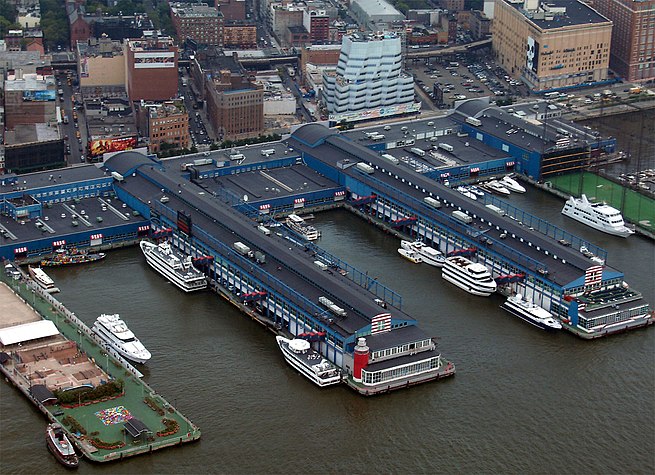-
Pier
A pier is a raised structure in a body of water, typically supported by well-spaced piles or pillars. Bridges, buildings, and walkways may all be supported by piers. Their open structure allows tides and currents to flow relatively unhindered, whereas the more solid foundations of a quay or the closely spaced piles of a wharf can act as a breakwater, and are consequently more liable to silting. Piers can range in size and complexity from a simple lightweight wooden structure to major structures extended over 1600 metres. In American English, a pier may be synonymous with a dock.
Piers have been built for several purposes, and because these different purposes have distinct regional variances, the term pier tends to have different nuances of meaning in different parts of the world. Thus in North America and Australia, where many ports were, until recently, built on the multiple pier model, the term tends to imply a current or former cargo-handling facility. In Europe in contrast, where ports more often use basins and river-side quays than piers, the term is principally associated with the image of a Victorian cast iron pleasure pier. However, the earliest piers pre-date the Victorian age.
-
Pier (noun)
A raised platform built from the shore out over water, supported on piles; used to secure, or provide access to shipping; a jetty.
-
Pier (noun)
A similar structure, especially at a seaside resort, used to provide entertainment.
-
Pier (noun)
A structure that projects tangentially from the shoreline to accommodate ships; often double-sided.
-
Pier (noun)
A structure supporting the junction between two spans of a bridge.
-
Pier (noun)
A rectangular pillar, or similar structure, that supports an arch, wall or roof.
-
Dock (noun)
Any of the genus Rumex of coarse weedy plants with small green flowers related to buckwheat, especially common dock, and used as potherbs and in folk medicine, especially in curing nettle rash.
-
Dock (noun)
A burdock plant, or the leaves of that plant.
-
Dock (noun)
The fleshy root of an animal’s tail.
-
Dock (noun)
The part of the tail which remains after the tail has been docked.
-
Dock (noun)
The buttocks or anus.
-
Dock (noun)
A leather case to cover the clipped or cut tail of a horse.
-
Dock (noun)
A fixed structure attached to shore to which a vessel is secured when in port.
-
Dock (noun)
The body of water between two piers.
-
Dock (noun)
A structure attached to shore for loading and unloading vessels.
-
Dock (noun)
A section of a hotel or restaurant.
“coffee dock”
-
Dock (noun)
A device designed as a base for holding a connected portable appliance such as a laptop computer (in this case, referred to as a docking station), or a mobile telephone, for providing the necessary electrical charge for its autonomy, or as a hardware extension for additional capabilities.
-
Dock (noun)
A toolbar that provides the user with a way of launching applications, and switching between running applications.
-
Dock (noun)
An act of docking; joining two things together.
-
Dock (noun)
Part of a courtroom where the accused sits.
-
Dock (verb)
To cut off a section of an animal’s tail, to practise a caudectomy.
-
Dock (verb)
To reduce (wages); to deduct from.
-
Dock (verb)
To cut off, bar, or destroy.
“to dock an entail”
-
Dock (verb)
To land at a harbour.
-
Dock (verb)
To join two moving items.
-
Dock (verb)
To drag a user interface element (such as a toolbar) to a position on screen where it snaps into place.

